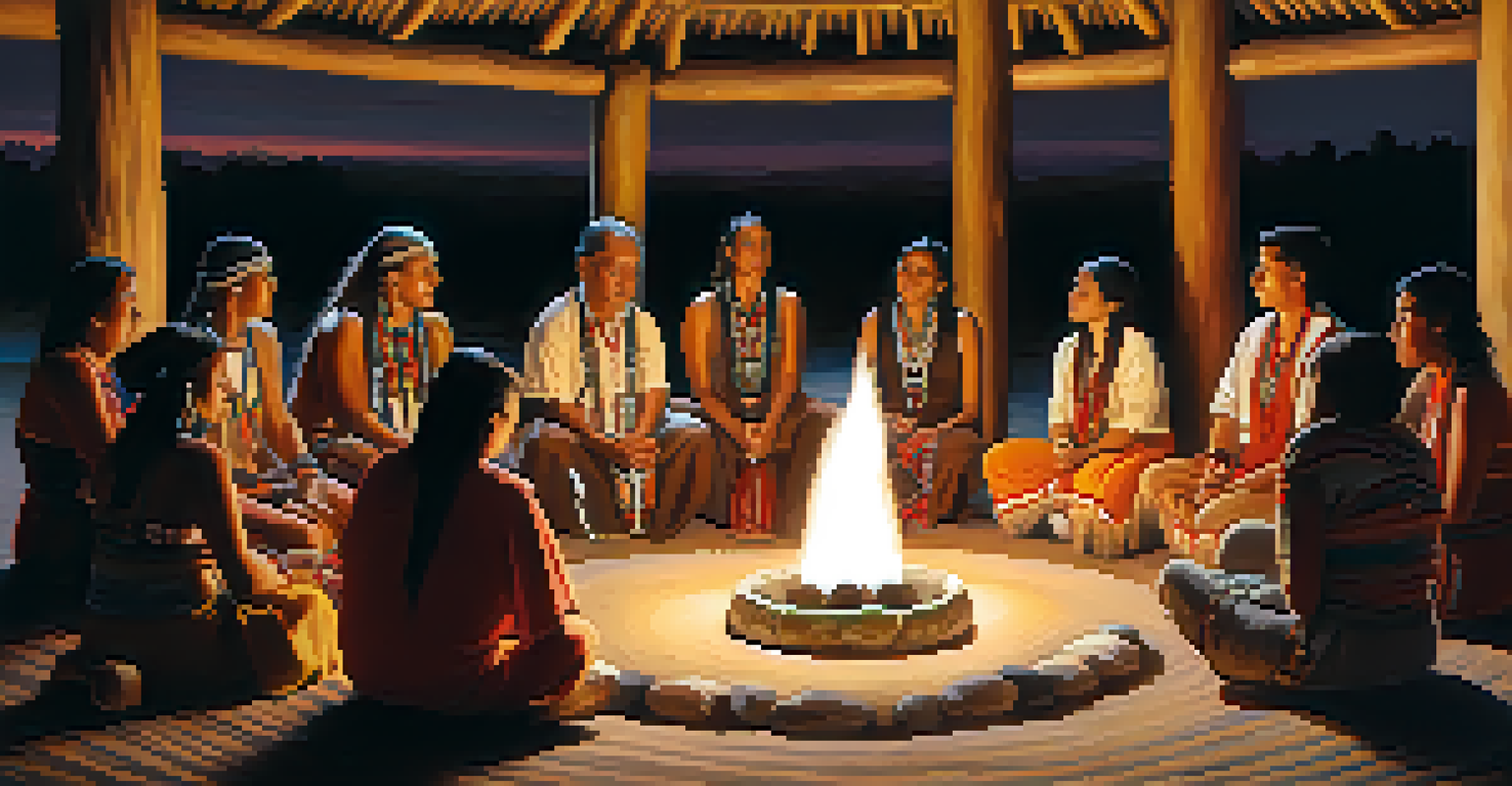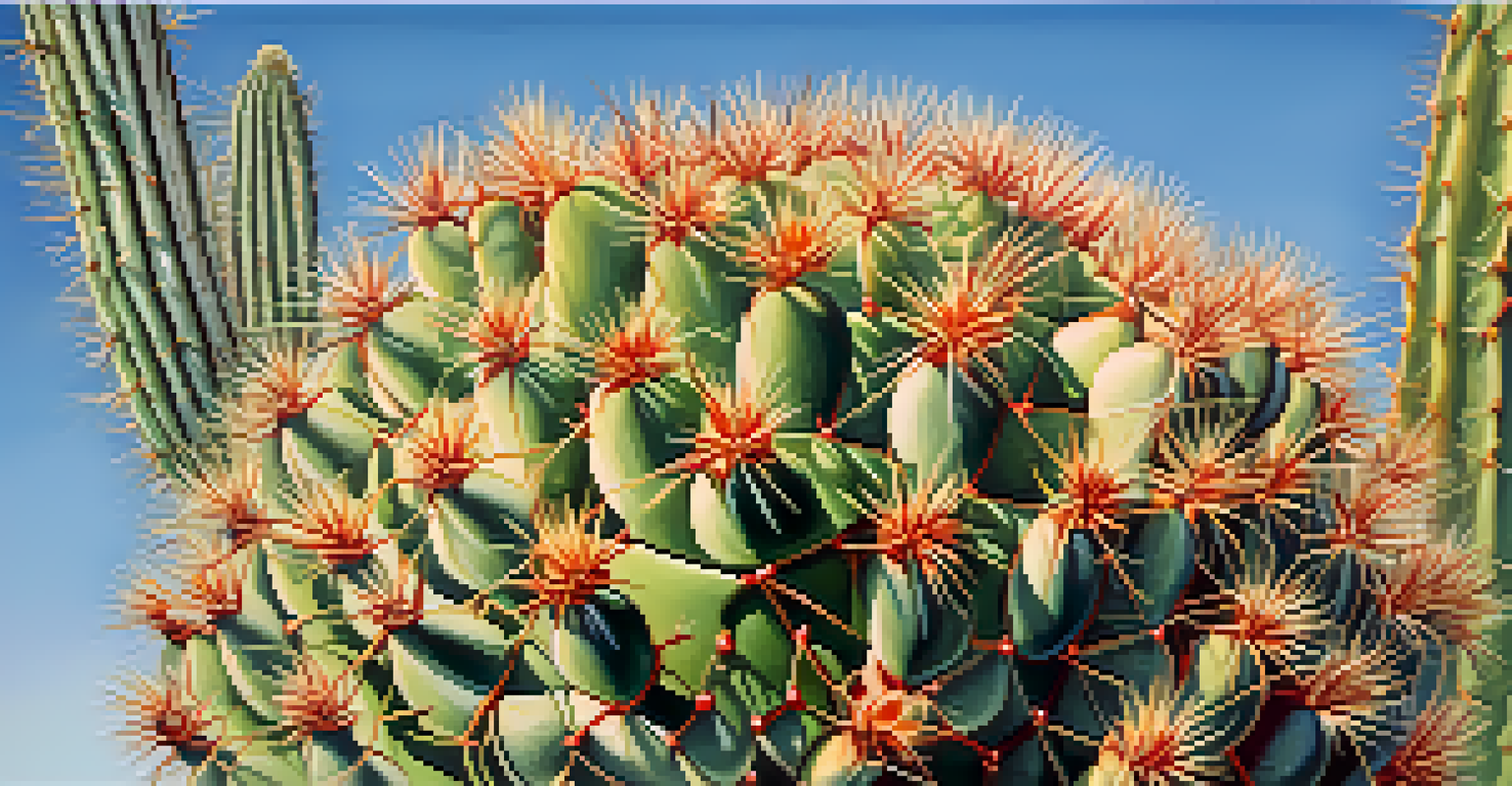Peyote and Identity: Indigenous Practices in a Global Context

Understanding Peyote and Its Cultural Significance
Peyote, a small cactus native to North America, holds profound spiritual significance for many Indigenous peoples. Often recognized for its psychoactive properties, this plant has been used in traditional ceremonies for centuries. For communities such as the Huichol and the Native American Church, Peyote is not merely a substance; it is a sacred teacher that facilitates deep spiritual connections.
Peyote is a sacred teacher that facilitates deep spiritual connections.
The use of Peyote aligns with a broader understanding of identity, particularly for Indigenous groups who see their traditions as integral to their cultural survival. Through rituals involving Peyote, individuals often explore their personal and collective identities, reinforcing community bonds. This practice transcends mere usage, becoming a vital component of their spiritual and cultural heritage.
In a global context, the significance of Peyote stretches beyond its geographical roots. As interest in Indigenous practices grows, so does the discussion surrounding the ethical considerations of using Peyote outside its traditional contexts. This intersection of cultural appropriation and respect for Indigenous identity raises important questions about authenticity and reverence.
The Role of Peyote in Indigenous Ceremonies
Peyote ceremonies are rich in symbolism and purpose, often centered around healing, guidance, and community cohesion. These rituals, led by experienced spiritual leaders, create a space for participants to engage deeply with their spirituality. The experience is often described as both introspective and communal, allowing individuals to reflect on their lives while feeling connected to their ancestors.

During these ceremonies, participants consume Peyote in a controlled and respectful manner, focusing on intentions that reinforce their cultural identity. The environment is typically sacred, filled with songs, prayers, and the sharing of personal stories. This collective approach to spirituality amplifies the sense of belonging and reinforces the values that define the community.
Peyote's Spiritual Importance
Peyote serves as a sacred teacher for Indigenous peoples, facilitating deep spiritual connections and reinforcing cultural identity.
Furthermore, the teachings and insights gained during these ceremonies often carry over into daily life, aiding individuals in navigating challenges. This ongoing connection to their culture through Peyote enhances their understanding of identity, instilling pride in their heritage. In this way, Peyote becomes a conduit for not just spiritual exploration, but also cultural affirmation.
Modern Challenges Facing Peyote Use
As the popularity of Peyote increases globally, Indigenous communities face several challenges regarding its use. One significant issue is the overharvesting of Peyote, which threatens its availability for traditional practices. This ecological concern highlights a broader tension between commercial interest and cultural preservation, as the demand for Peyote grows among non-Indigenous users.
The use of Peyote is essential to our identity and existence.
Additionally, the commercialization of Peyote rituals can dilute their cultural significance. When practices are commodified, they risk losing their sacred meaning, transforming spiritual experiences into mere entertainment. This shift not only undermines the authenticity of Indigenous practices but also impacts the communities that have relied on Peyote for generations.
Indigenous activists are increasingly vocal about these challenges, advocating for the protection of their sacred practices. They stress the importance of respecting the cultural context of Peyote and emphasize that its use should be reserved for those who understand its significance. This push for acknowledgment and respect is crucial in maintaining the integrity of Peyote as a cultural symbol.
Global Perspectives on Peyote and Indigenous Identity
Peyote's journey from a local Indigenous practice to a globally recognized symbol of spirituality reflects broader themes of cultural exchange and identity. In various cultures, people are drawn to the plant's psychoactive properties, often seeking healing or enlightenment. However, this interest can lead to misunderstandings and misrepresentations of its significance in Indigenous cultures.
The interest in Peyote is part of a larger movement towards exploring alternative spiritualities, but it often lacks the context that makes these practices meaningful. This can result in cultural appropriation, where individuals adopt elements of Indigenous culture without understanding their significance. Such actions can alienate Indigenous peoples and contribute to the erasure of their histories and identities.
Challenges of Cultural Appropriation
The increasing global interest in Peyote raises concerns about overharvesting and the risk of diluting its cultural significance through commercialization.
To foster a more respectful relationship with Peyote, it is essential for non-Indigenous individuals to engage with these practices mindfully. Understanding the roots and meanings of Peyote ceremonies is crucial for building bridges of respect and appreciation. By honoring these traditions, we can contribute to a more inclusive understanding of spirituality that values Indigenous voices.
Peyote and the Fight for Indigenous Rights
The use of Peyote is intricately linked to broader movements advocating for Indigenous rights and sovereignty. Many Indigenous groups assert that their cultural practices, including the use of Peyote, are essential to their identity and existence. This assertion has led to legal battles aimed at protecting their rights to practice their traditions without interference.
In the United States, the American Indian Religious Freedom Act has provided some legal protection for the use of Peyote in religious ceremonies. However, challenges remain, as non-Indigenous interests often conflict with Indigenous rights. The ongoing struggle emphasizes the importance of recognizing and upholding Indigenous sovereignty.
Furthermore, the fight for rights extends beyond legal frameworks; it encompasses the need for social recognition and respect for Indigenous cultures. Supporting Indigenous communities in their quest for self-determination includes amplifying their voices and understanding their narratives. This solidarity is crucial in fostering a society that values diversity and respects cultural practices.
Educational Initiatives and Awareness of Peyote Culture
Raising awareness about the cultural significance of Peyote is essential for fostering respect and understanding. Educational initiatives aimed at both Indigenous and non-Indigenous communities can bridge knowledge gaps. Such programs often focus on the historical and spiritual dimensions of Peyote use, emphasizing its role in Indigenous identity and community life.
Workshops, documentaries, and community events can serve as platforms for sharing the stories of those who practice Peyote traditions. These initiatives allow participants to engage directly with Indigenous perspectives, fostering empathy and appreciation for their cultural practices. Education becomes a powerful tool for dismantling stereotypes and promoting a more nuanced understanding of Indigenous spirituality.
Advocacy for Indigenous Rights
The use of Peyote is intertwined with broader movements for Indigenous rights, emphasizing the need for recognition and respect for their cultural practices.
Moreover, these educational efforts can empower Indigenous youth to connect with their heritage and embrace their identities. By learning about the significance of Peyote and other cultural practices, young people can cultivate a sense of pride in their ancestry. This generational knowledge transfer is vital for the continuation of cultural traditions, ensuring that they thrive in a globalized world.
Conclusion: Embracing Peyote with Respect and Understanding
In conclusion, Peyote embodies deep cultural significance for Indigenous peoples, serving as a vital link to their identity and heritage. As interest in Peyote grows globally, it is crucial to approach this practice with respect and understanding. Engaging with Indigenous communities and honoring their traditions can pave the way for a more inclusive and respectful dialogue about spirituality.
Recognizing the challenges faced by Indigenous groups in protecting their sacred practices is essential. By advocating for their rights and supporting their efforts to maintain cultural integrity, we can help ensure that Peyote remains a meaningful aspect of their identity. This commitment to respect and understanding fosters a more equitable relationship between Indigenous and non-Indigenous communities.

Ultimately, embracing Peyote requires a willingness to learn, listen, and engage authentically. By valuing Indigenous perspectives and practices, we can contribute to a world that honors diversity and celebrates cultural richness. Through this collective effort, we can create a space where spiritual practices are appreciated for their depth and significance.